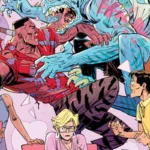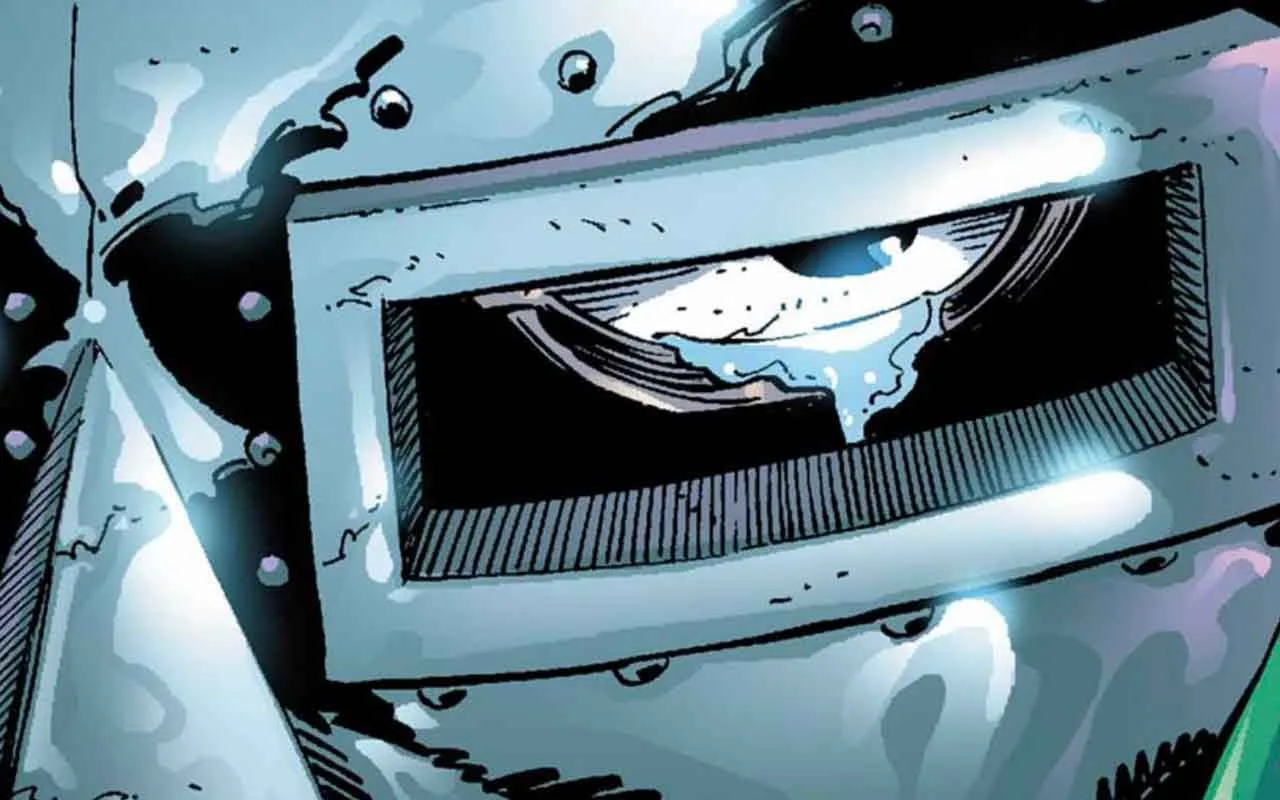For more than 30 years, across the mediums of comics, film, and television, writer J. Michael Straczynski has layered a warning into his writing: it can happen here. It can happen to us.
Throughout his body of work, Straczynski continually interrogates authoritarianism and resistance, predicts the use and format of cable news to create “alternative facts,” how societies slide into dehumanizing the Other, and how fascism courts the disillusioned “forgotten” American.
Babylon 5 was a case study in information warfare and institutional capture. The cautions in his 9/11 issue of Amazing Spider-Man go unheeded as he examines creeping surveillance, militarization, and securitization. Most recently, his Captain America run for Marvel directly confronts the parallels between the rise of American fascism in the 1930s and today.
Babylon 5 and the Manufacturing of “Alternative Facts”
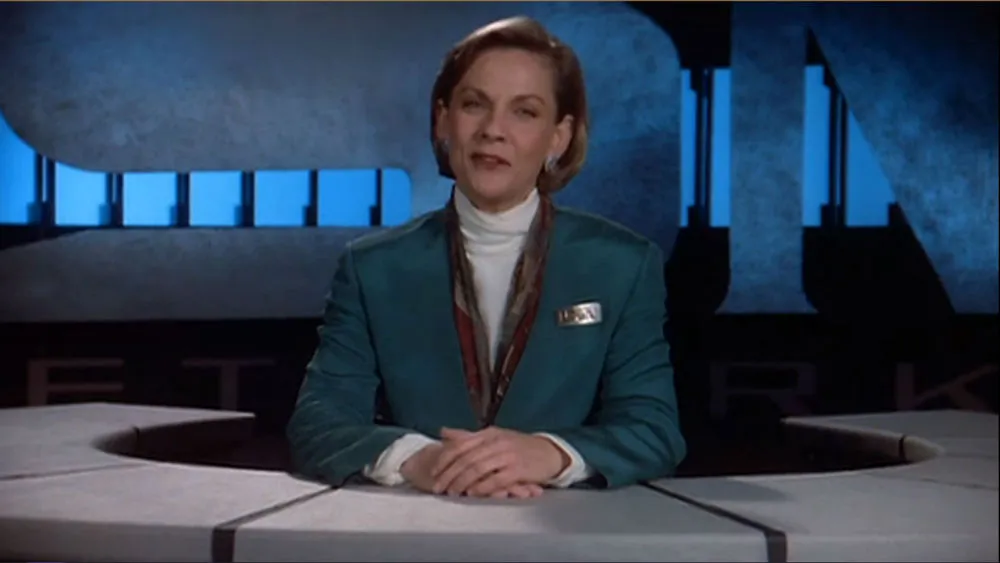
Over its five seasons of super-arc storytelling, Babylon 5 utilizes the lens of science fiction to show how authoritarianism uses the power of narrative to reshape what citizens believe is true, normal, and necessary.
One of the ways the regime achieves its goals in Babylon 5 is through the use of state propaganda as infrastructure. ISN is Fox News before Fox News: Babylon 5 introduces ISN in May of 1995; Fox News would air its inaugural broadcast on October 7, 1996. Midway through the show’s second season, EarthGov’s ascendant Clark regime actively co-opts the media to launder government claims into common sense.
The first episode where this approach appears is Season 2, Episode 15, “And Now For a Word.” The entire episode is structured as an in-universe news broadcast edited and retransmitted after the fact. The show immediately shows the position of the network, as its anchor reports that “According to figures released by the newly formed Office of Public Morale, President William Clark has risen to dramatic new levels of popularity because of his administration’s emphasis on addressing the needs of Earth.”
The anchor sponsor for the entire broadcast is Interplanetary Expeditions (IPX). Later stories will reveal that IPX is the Earthly agency acting on behalf of the Shadows. Watchers of the show who possess the context that the average ISN viewer does not would know that it is the Shadows who stoke the conflict between the Narn and the Centauri, and ensure that an outburst takes place while the ISN crew is there to film it and report back in a manner that casts B5 in a poor light.
It’s clear from the moment that the Shadow-backed Clark regime begins to exert control over the press that the endgame is an isolationist Earth which eschews contact with aliens and focuses inward on what a later talk radio host would call “borders, language, culture.”
Immediately following “And Now For a Word,” the show introduces a new “special” civilian service promoted by the Clark Administration: The Nightwatch.
The language used by the Nightwatch liaison from the administration directly echoes that of authoritarian fascist movements in Germany and Italy, which commanded that people observe and report on their neighbors, their colleagues, and even their own families. Participants are offered a small stipend as a reward for wearing the black armband and filing their reports. Against the backdrop of budget cuts from one hand of the government removing economic support, it’s clear that the Clark regime prioritizes surveillance and control over service and support. It is those networks of service and support which B5’s Captain Sheridan will reinforce and rely upon as he contends with the dark powers behind Earth’s turn over the life of the show.
Babylon 5 comes as a warning near the end of America’s peak as an unchallenged global superpower able to enforce its will anywhere on Earth. By the time America’s hard pivot to authoritarianism came, JMS had moved his storytelling from far-flung space stations to the streets of New York City as the writer on Amazing Spider-Man.
Spider-Man and the Ethics of Humanization
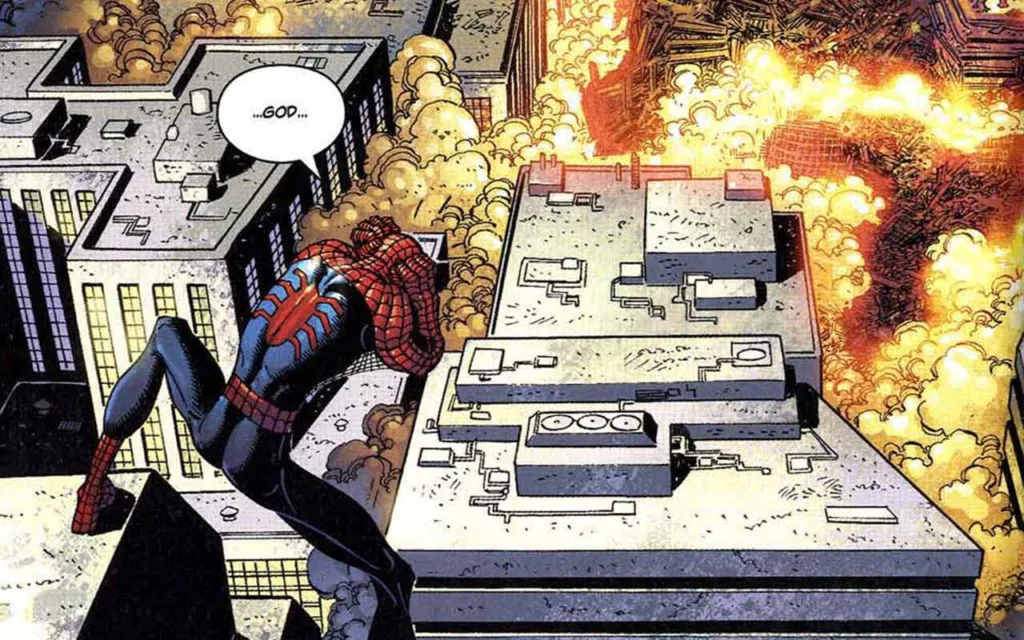
At the time of its release, the 9/11 issue of Amazing Spider-Man perhaps most accurately captured the sense of righteous anger and jingoistic resolve that swept across the nation in the wake of the attacks.
The 9/11 issue’s warning? As JMS writes in its pages, “That the burdens of distant people are the responsibility of all men and women of conscience, or their burdens will one day become our tragedy.” He instead pleads with the reader to “Draft a covenant with your conscience, that we will create a world in which such things need not occur. A world which will not require apologies to children, but also a world whose roads are not paved with the husks of their inalienable rights.”
The Marvel Universe, and our own, would fail to heed that warning.
Through Marvel’s Civil War era (the 2006 event series and related spinoffs), Straczynski would shine a light on the creeping militarization of those who had been our protectors and servants. Peter Parker’s unmasking and entry into government service, along with his subsequent rebellion against Tony Stark and the pro-registration forces, allowed Straczynski to demonstrate how civic approval, “transparency,” and their coercive allure are all brought into play by authoritarian regimes as a way of legitimizing their tighter control.
Before leaving Amazing Spider-Man soon after the “One More Day” storyline, Straczynski pulled Peter Parker back to his roots. He removed him from the big world-spanning stories like Civil War and returned him to street-level stories. Peter took a role as a teacher and mentor, tackling problems that mattered to everyday people. He attempted to have the character illustrate that a great power’s primary responsibility is to the people.
Sadly, like his earlier warnings in the book, this appeal would go unheeded. We would not tend to the problems of the everyday person in our society over the next twenty years. So, when Straczynski returned to Marvel with Captain America, it was to address a nation facing a much more pressing threat.
Captain America and the Seduction of the Forgotten American
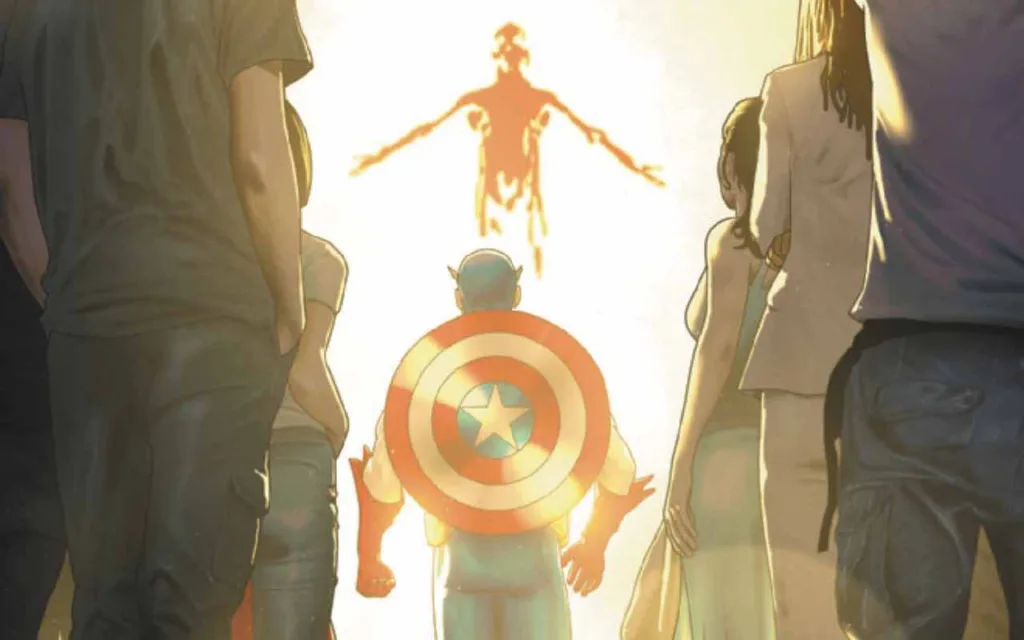
JMS returned to the character of Steve Rogers in 2023, in the space betwen two Trump administrations. He had seen firsthand how the MAGA movement had played on the economic insecurities and deeply-rooted racial animus in the country in their pursuit of power.
In response to the moment, Straczynski takes readers into the time in Steve Rogers’ history when America last faced its very real flirtation with fascism. In a series of flashbacks to his pre-serum days as “Skinny Steve,” we see how even he is at first lured in by the promise of a hot meal and that “America will rise as she has never risen before. She will be more powerful than she has ever been!” All of this before an appeal to join the very real German-American Bund.
The Bund in the story plays on the same fears and fault lines that the Bund used in the real world to very nearly topple the American government in favor of one friendly to Germany. They pull in the lonely whose support networks have been devastated by a decade of disease and economic decline. They pull in the dispossessed who the government fails to help. They pull in people who feel that they have been manipulated by the weak and must therefore push back in order to feel strong.
At the end, the answer is simple. Steve combats fascism not by just punching it in the face, but by attacking the systemic problems which provide such movements with the people who fuel them.
Across all the media where he’s been warning us for the past 30 years about the creeping rise of fascism in America, Straczynski has shown us how authoritarian regimes reshape the truth, how they bend our protectors into our imprisoners, and how they use our economic stressors to capture us for their own purposes. He also tells us over and over where to find the solution: in the streets. With our neighbors. Teaching, learning, and listening.
Comic Book Club Live Info:
Discover more from Comic Book Club
Subscribe to get the latest posts sent to your email.
